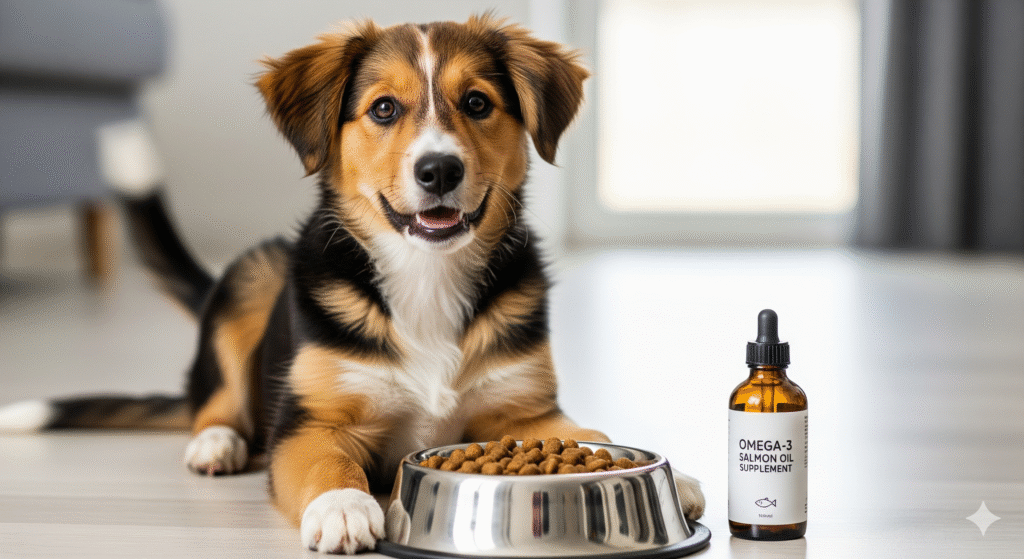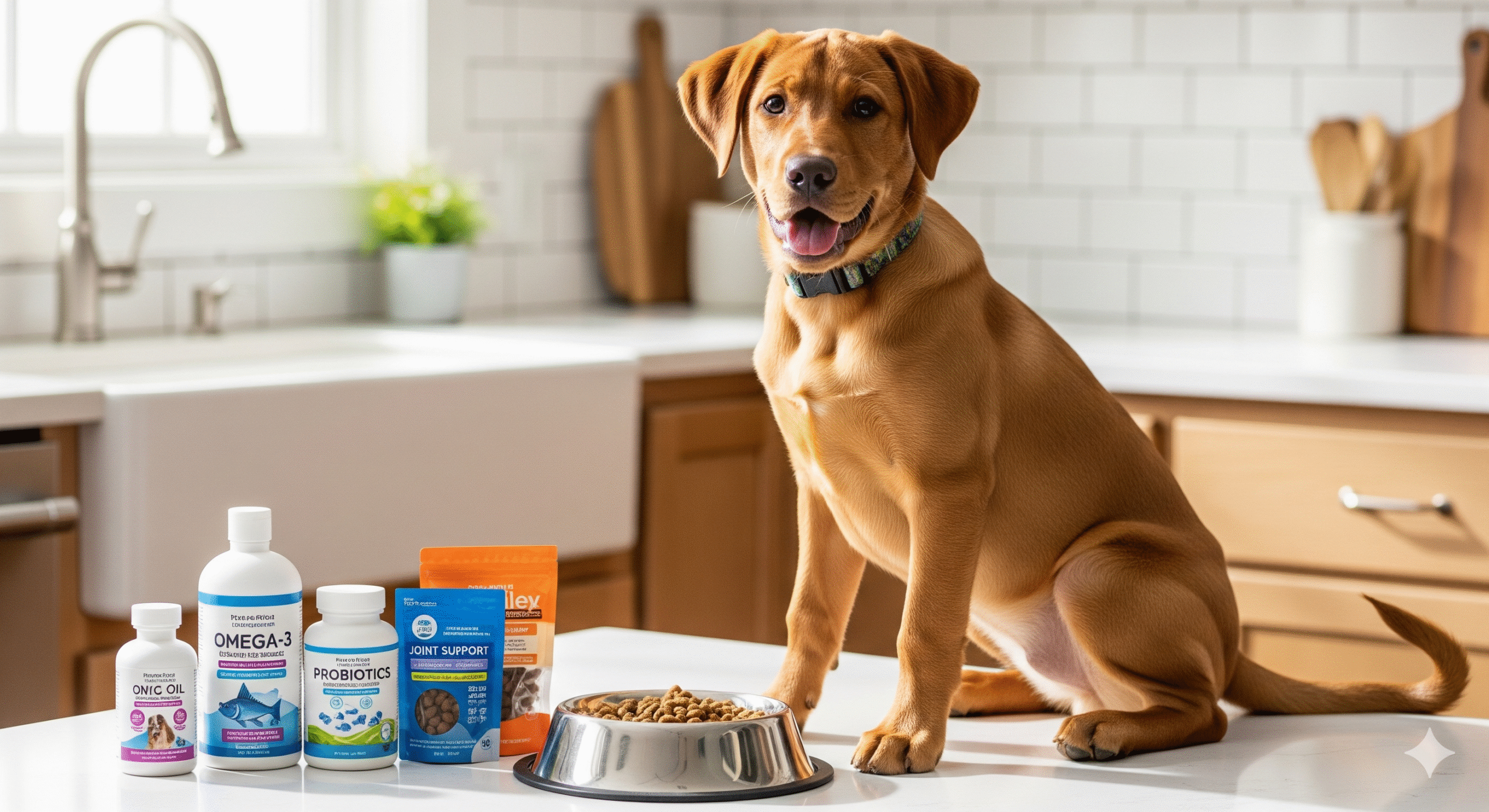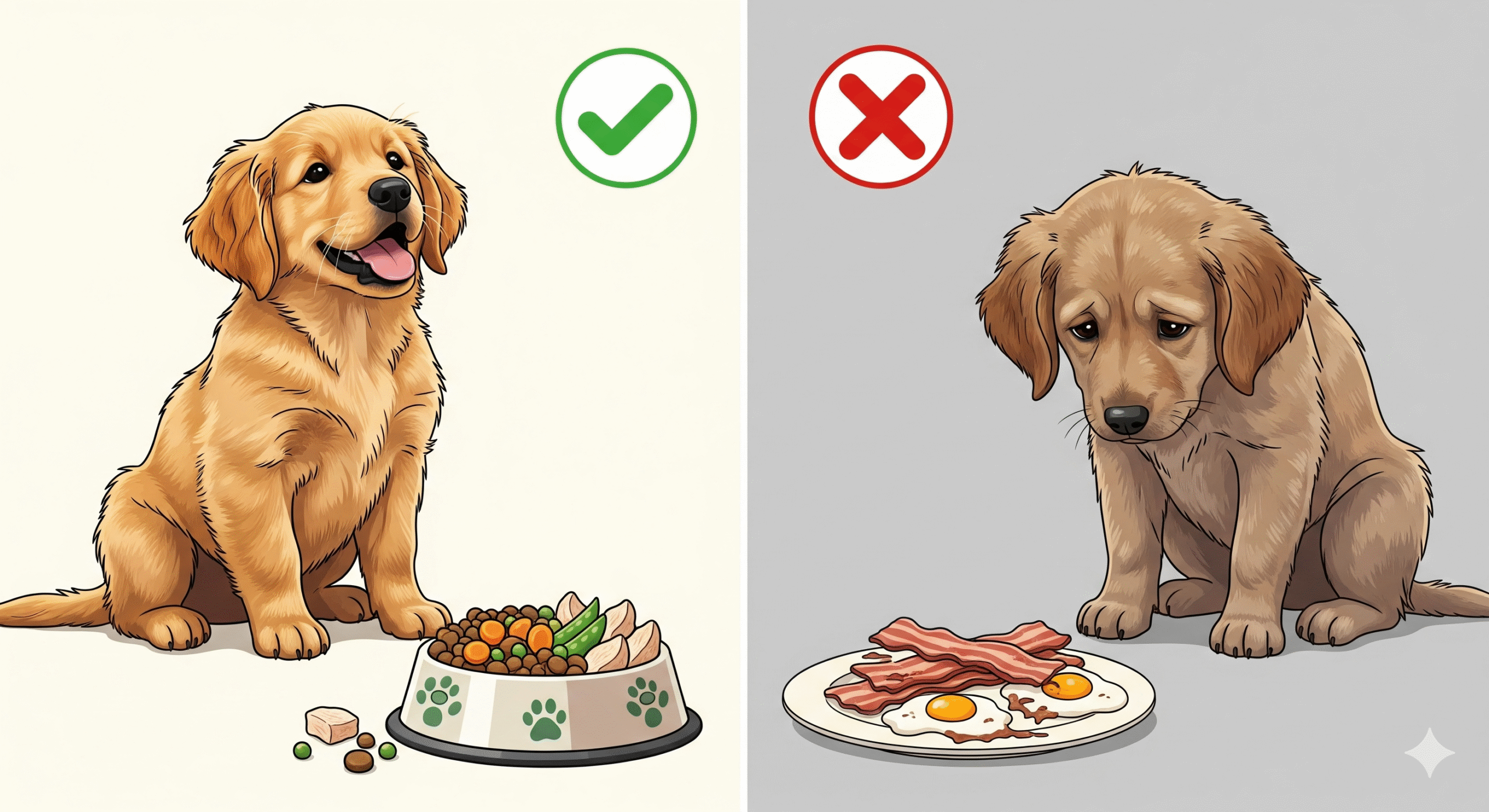Watching your puppy grow is an incredible journey. To support this rapid period of development, you’re feeding them a high-quality puppy food, but is it enough? The world of puppy supplements can be overwhelming, filled with promises of shinier coats, stronger joints, and smarter pups. While a balanced, AAFCO-approved puppy food should be the foundation of their nutrition, certain supplements can play a crucial, targeted role in addressing specific needs, filling potential gaps, and setting your dog up for a lifetime of health.
However, the “more is better” approach is dangerous with growing puppies. Their bodies are finely tuned for development, and oversupplementing, particularly with calcium and vitamins, can cause severe, irreversible harm. This guide will help you navigate this complex landscape, distinguishing between beneficial additions and unnecessary—or even harmful—extras.
Here’s what we’ll cover:
✔️ The #1 rule of puppy supplementation: When are they actually needed?
✔️ A detailed breakdown of the most beneficial supplements and what they do
✔️ Breed-specific considerations for large and giant breeds
✔️ How to choose a high-quality, safe supplement from a trustworthy brand
✔️ Red flags to avoid in the supplement industry
✔️ Veterinary insights on which supplements are backed by science
Let’s build a solid foundation for your puppy’s health without falling for marketing gimmicks.
The Golden Rule: First, Do No Harm 🛑
The most important principle in puppy supplementation is that no supplement should be given without a specific reason and, ideally, veterinary guidance.
- Risk of Over-Supplementation: Excess calcium can disrupt skeletal development in large breeds. Too much Vitamin D or A can be toxic.
- AAFCO Standards: A high-quality commercial puppy food that meets AAFCO (Association of American Feed Control Officials) standards for “growth” is formulated to be nutritionally complete and balanced.
- The “Why”: Before adding any supplement, ask: “What specific need or potential deficiency am I addressing?” If you don’t have a clear answer, you likely don’t need the supplement.
When Are Puppy Supplements Actually Beneficial? ✅
Supplements are not a blanket requirement but a targeted tool. They are most useful in these scenarios:
- Puppies on Home-Cooked or Raw Diets: These diets are notoriously difficult to balance correctly. Supplementation is not optional here; it is mandatory and should be directed by a veterinary nutritionist.
- Puppies with Specific Health Conditions: Conditions like exocrine pancreatic insufficiency (EPI) require enzyme supplements.
- During and After Antibiotic Use: Probiotics can help restore healthy gut flora.
- Large and Giant Breed Puppies: They have unique joint development needs.
- Puppies Showing Signs of Deficiency: This should always be diagnosed by a vet.
The Top Beneficial Supplements for Puppies: An Evidence-Based Guide 🔬
For the average healthy puppy on a commercial diet, very few supplements are needed. However, these have the most scientific backing for specific purposes.
1. Probiotics & Prebiotics 🦠
- What they are: Live, beneficial bacteria (probiotics) and the fibers that feed them (prebiotics).
- Benefits: Support a healthy gut microbiome, which is linked to improved digestion, a stronger immune system, and even better behavior. Essential during antibiotic treatment or periods of stress.
- Best For: All puppies, especially during dietary transitions, after illness, or for those with sensitive stomachs.
- Look For: Products with guaranteed live cell counts and strains like Enterococcus faecium and Bacillus coagulans.
2. Omega-3 Fatty Acids (EPA & DHA) 🐟
- What they are: Essential fatty acids found primarily in fish oil.
- Benefits: DHA is crucial for brain and retinal development in puppies. EPA is a powerful anti-inflammatory that supports skin, coat, and joint health.
- Best For: All puppies, but especially breeds prone to skin allergies or joint issues.
- Look For: A product that lists the specific amounts of EPA and DHA on the label. Liquid forms are often easier to dose for puppies.
3. Joint Support Supplements (For Large Breeds) 🦴
- What they are: Typically contain glucosamine, chondroitin, and MSM.
- Benefits: Support the development of healthy cartilage and joint fluid. Can be preventative for breeds prone to hip and elbow dysplasia.
- Best For: Large and giant breed puppies (e.g., Labrador Retrievers, German Shepherds, Great Danes). Not typically needed for small breeds.
- Look For: Veterinary-recommended brands like Dasuquin or Cosequin that have proven bioavailability.
4. Digestive Enzymes 🍃
- What they are: Enzymes that help break down food (proteases for protein, lipases for fat, amylases for carbs).
- Benefits: Can aid puppies with inefficient digestion, leading to better nutrient absorption and smaller, firmer stools.
- Best For: Puppies with chronic soft stool or those on high-volume diets where digestion may be strained.
Supplements to Avoid or Use with Extreme Caution ⚠️
- Calcium: Never supplement calcium without direct veterinary instruction. The calcium-to-phosphorus ratio is critical for puppies, and disrupting it can cause severe skeletal deformities.
- Multivitamins: A puppy on a balanced commercial diet does not need extra vitamins. Oversupplementing fat-soluble vitamins (A, D, E, K) can be toxic.
- “Super” or Novel Ingredients: Be wary of products with long lists of exotic ingredients (like deer antler velvet) that have little to no scientific backing for puppies. Stick with proven, research-supported compounds.
How to Choose a High-Quality Supplement: A Buyer’s Guide 🔍
- Consult Your Veterinarian: This is the most important step. They can recommend brands they trust and doses specific to your puppy’s size and needs.
- Look for the NASC Seal: The National Animal Supplement Council (NASC) seal means the company has passed a quality audit and follows good manufacturing practices.
- Check for Third-Party Testing: Reputable brands will have their products tested by an independent lab for purity and potency to ensure the label is accurate.
- Read the Label: It should clearly state the active ingredients and their amounts. Avoid products with a long list of “other ingredients” and fillers.
Final Checklist: Should You Supplement? ✅
☑️ My puppy is on a commercial AAFCO-approved diet.
☑️ I have spoken to my veterinarian about a specific need.
☑️ I am not supplementing with calcium or a multivitamin without vet guidance.
☑️ I have chosen a supplement from a reputable brand with transparent labeling.
☑️ I am introducing one supplement at a time to monitor for any adverse effects.

…It’s normal for puppies to be a little tired or sore after their shots, but these effects should pass quickly. Sometimes, the stress of a vet visit can even cause minor digestive upset. To keep their system in top shape during these new experiences, you might be interested in our guide on Probiotics for Puppies: When & Which to Use.






